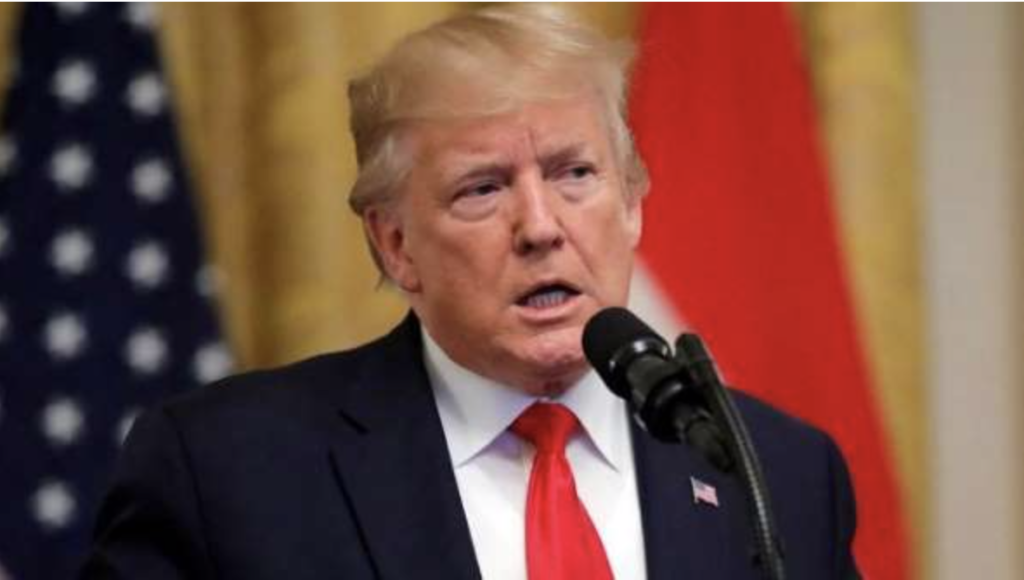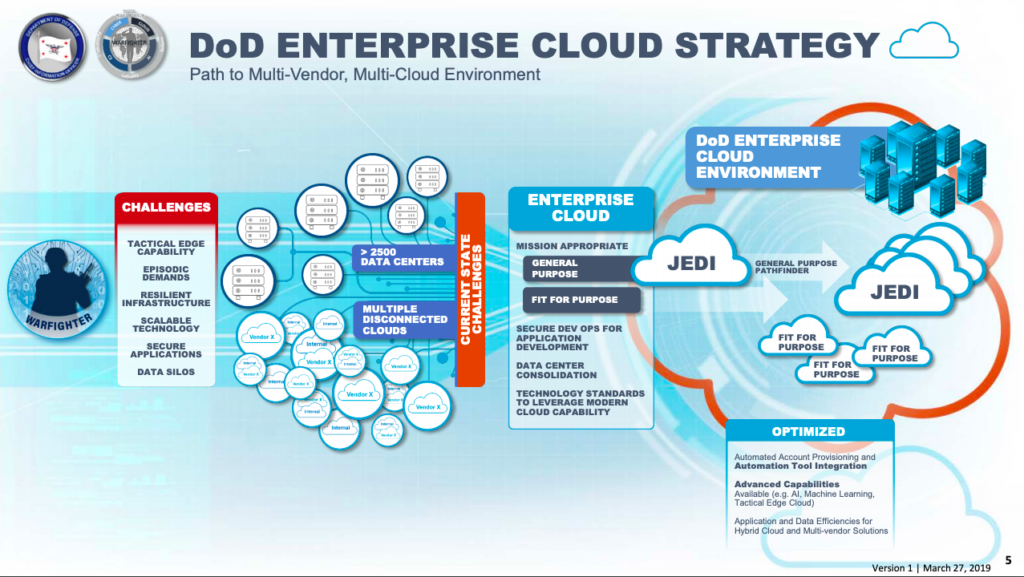
Amazon founder Jeff Bezos in the control center of his space launch company, Blue Origin, before the first test launch of its New Shepherd rocket.
UPDATED with Berteau analysis WASHINGTON: The JEDI saga is far from over. Microsoft may have won the long-delayed cloud-computing award announced on Friday, but losing bidder Amazon is all but certain to protest – and the ongoing impeachment process against President Trump will be a crucial factor in their case.

Steven Schooner
“There’s not much precedent for the President placing a thumb on the scale on a procurement of this magnitude,” said Steven Schooner, a GWU Law professor and outspoken critic of how JEDI has been managed. The closest thing he can think of, he told me in an interview, is Obama’s public hints he preferred the domestic contender for the Air Force’s refueling tanker, Boeing, over EADS-Airbus.
“But this is by no means a slam dunk,” Schooner warned. “The challenge for Amazon will be proving – with more than hearsay — that the pressure was applied and proving that the pressure worked — i.e. that the President’s bluster and blather wasn’t ignored.”
“I can’t recall any similar involvement by the President in a major DoD contract in recent memory,” agreed CSIS expert Andrew Hunter, a former Pentagon and congressional staffer. “The one potential exception is contracts for systems like Air Force One and Marine One aircraft which are so closely tied to the Presidency — not the case with JEDI — and even on those systems, Presidents have steered clear of commenting on an ongoing contract competition.”

Running Out Trump’s Clock?
Now, Hunter doubted the ongoing JEDI wrangle would turn up evidence of “high crimes and misdemeanors” that could influence the ongoing investigation in the House or a potential Senate trial: “The matter of the JEDI contract seems far afield of where the impeachment inquiry is currently focused.”

Andrew Hunter
But the impeachment process will definitely influence JEDI. Inside a courtroom, allegations that President Trump tried to strongarm the government of Ukraine into investigating a political rival give added ammunition to any argument by Amazon that he improperly meddled in the JEDI award as well. Outside a courtroom, the possibility of Trump’s impeachment, resignation, or defeat in next November’s election means Amazon can try a strategy of running out the clock on his administration. Amazon doesn’t necessarily have to convince the Government Accountability Organization, the Federal Court of Claims, or anyone else to overturn the award to Microsoft. They could just keep the question unsettled long enough for the next administration to give them another shot.
Or the Pentagon, which is desperate for the long-delayed cloud-computing capability JEDI would provide, could lose patience and offer Amazon a share of the work in exchange for dropping its case. There’s plenty of precedent for such a deal, Schooner said, and “that doesn’t seem like a crazy – or necessarily a bad – outcome here, where one of the most common critiques of the government’s acquisition strategy focused on DoD’s preference for a winner-take-all, single contractor award.”
So “this may be one of those cases where it’s worth litigating to [stall] the procurement for a few months or longer,” Schooner told me. “If Amazon perceives that there is any chance that, in the foreseeable future, the President may be impeached or choose to resign, they would want DoD to be in a position to re-evaluate proposals or even amend the solicitation.”
An Amazon protest to the Government Accountability Organization – and such protests have become common for losing bidders on major government contracts – would probably result in a three-month hold while GAO reviewed the matter.
UPDATE BEGINS Technically, the Defense Department could declare the JEDI contract so important that work had to proceed even as the GAO reviewed the award, said David Berteau, president of the Professional Services Council. But “that’s rare. It’s much more rare now than it was in decades past,” he said. “I would not expect that” on the already controversial and closely watched JEDI contract.

David Berteau
The normal process Berteau would expect to be followed here, he explained to reporters this afternoon, allows the losing bidders — in this case, Amazon — to request a debriefing from the government on exactly why they lost. That debrief could happen as early as tomorrow, he said, given that both Amazon and the Pentagon are probably primed and ready after all the delays. After the debrief, Amazon would have 10 days to file a protest, after which it would get 10 days to do initial discovery — a process which often digs up additional problems the company can raise in an amended protest, he said.
So, Berteau said, keep an eye not only on whether Amazon files a protest this week or next, but whether it files an amended protest within the 10 days after that. While some protests to GAO are pro forma and easily overturned, he said, “the government’s success rate when an amended protest is filed is very low.” UPDATE ENDS
If GAO overrules Amazon’s protest over the award to Microsoft, as it did Oracle’s protest over being disqualified from the competition, Amazon could follow Oracle’s example and file suit in the Court of Federal Claims. (The irony here is that Oracle’s claim was that the JEDI procurement was unfairly slanted in favor of Amazon). It took the court seven months to decide Oracle’s case. If the whole GAO plus CFC process takes the same amount of time for Amazon, 10 months, that keeps the contract up in the air until August 2020.
But with clever legal tactics and some legal luck, Amazon might keep the case alive even longer, right through the presidential election. A GAO protest could drag on for “approximately four to six months,” Hunter told me.

The Pentagon’s plan to consolidate many — but not all — of its 500-plus cloud contracts into a single Joint Enterprise Defense Infrastructure (JEDI). Note the suggestion that the single “pathfinder” contract for JEDI might evolve into multiple JEDI contracts.
On What Grounds?
Now, the GAO and the court would address the case in very different ways. While a congressional agency exempt from presidential oversight, GAO still prefers to limit its inquiry to narrow technical matters as much as possible, focusing on whether the agency awarding the contract followed its own rules. The Federal Court of Claims has much more leeway to look at wider matters.
UPDATE GAO is unlikely to look at President Trump’s public statements at all, argued Berteau, whose decades of experience in the Pentagon and defense industry has put him on both sides of GAO protests in the past.
“We don’t actually know what the president’s involvement in the decision was,” Berteau told reporters this afternoon. “We know the president’s comments that have been made publicly, [but] GAO ignores that….I don’t see that it plays a role at all.”
That is, Berteau emphasized, the president’s vituperations are irrelevant to a GAO review — but “it might be a different case in a lawsuit,” he went on. “It depends on the basis of the suit, the allegations, and the remedies sought.” UPDATE ENDS
“There is nothing that would stop Amazon from protesting at GAO first on issues that GAO traditionally examines, and then making a broader claim to the Court of Federal Claims second,” Hunter told me.
“A GAO protest would examine whether DoD had sufficient justification for its evaluation of the bidders. I’m not sure the outcome of that examination would appreciably change even if unusual Presidential involvement beyond what is already publicly known were discovered,” Hunter explained. “The Court of Federal Claims has a broader mandate, and so could potentially look at whether presidential ‘command influence’ irreparably skewed the competition.”
Now, the court could still find evidence of improper behavior and still uphold the award because those improprieties were not decisive, as it did in Oracle’s case. “Many found Oracle’s allegations of conflicts favoring Amazon to be persuasive, and I wasn’t alone in being surprised when Court of Federal Claims Judge Bruggink chronicled the conflicts, acknowledged they were troubling, but nonetheless concluded that they didn’t unfairly tilt the playing field,” Schooner said. “So just keep in mind that recent, relevant experience demonstrates that winning a conflicts or improper influence case isn’t always as easy as it appears.”
That said, the officials accused of favoring Amazon didn’t tweet about it, the way President Trump has done repeatedly about his “frequently demonstrated animus toward Amazon’s CEO Jeff Bezos,” Schooner said.
What’s more, “recent media reports reference an excerpt from the forthcoming Mattis book … which President Trump may have directly attempted to harm Amazon’s competitive standing,” Schooner noted. “A judge could easily conclude that government officials were unable to exercise independent judgment in selecting Microsoft if Amazon can demonstrate, as a matter of fact, that President clearly directed DoD officials to ensure that Amazon not be fairly considered or awarded the contract.”
“In light of the public media record, Amazon also may well choose to argue that the President’s actions and the outcome suggest that DOD ‘de facto debarred’ Amazon from lucrative work during this administration,” Schooner suggested. “That might be a stretch — because there doesn’t appear to be any underlying concern about Amazon’s business integrity — but, given the stakes, some creative lawyering might try to push the envelope.”
Given the legal ammunition available and the financial stakes – up to $10 billion and a 10-year lock on a crucial piece of the Pentagon’s computing infrastructure — “it’s hard to see what Amazon has to lose by testing the waters,” Schooner told me.
Major trends and takeaways from the Defense Department’s Unfunded Priority Lists
Mark Cancian and Chris Park of CSIS break down what is in this year’s unfunded priority lists and what they say about the state of the US military.


























